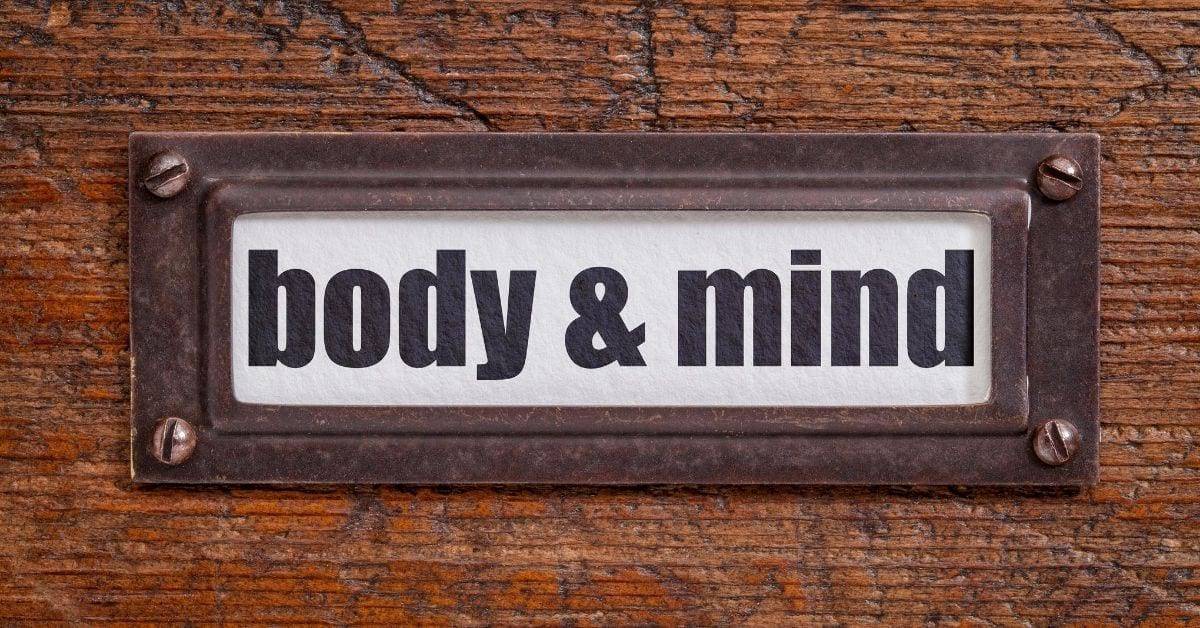Home > Emotional wellbeing > Mental health > The Physical Side of Mental Health: Mind and Body


When we think of mental health, we think just of that. Mental; in our heads. But what often goes hand in hand with mental health struggles, are the physical reactions our bodies have. Here at Selfish Darling, we have talked about emotional pain and listening to your body before, so we are well acquainted with understating just how important the connection between our mind and body is.
Mental health hurts.
Our brain and body are constantly sending message back and forth to keep us healthy and safe and determines the way we react to things. A lot of the time, we’re aware of these connections. Having a stressful time might give you a headache, nerves make you nauseous and being angry can make you feel hot and tense. We can feel our body reacting to external and internal stimuli, triggering a response.
The way our minds and bodies link is a pretty fascinating subject, by the way. If you’re curious to know why stress gives you spots or being sad gives your stomach ache. Your brain registers pain, and instantly looks for where in the body you might be hurt. Usually the guts get the brunt of it. Poor guts.
Mental health produces these same responses.
For a lot of us, it is the physiological responses our bodies have to issues that make things difficult.
Anxiety can go a lot further than nausea or shaking. Physical responses to anxiety can include:
I’ve woken up when my anxiety is bad with an aching jaw from grinding my teeth in my sleep. I also drink a lot of water and subsequently, I am indeed an anxious pee-er (peer?). Feeling tight, tired, achy and sick are usually the ways I even identify that my anxiety is triggered in the first place.
Often found going hand in hand with anxiety up there, depression can make your body feel pretty much as bad as you do mentally.
Changes in sleep patterns, eating habits and fluctuations in weight are common symptoms of depression. And it’s hard to wrestle with everything going on your head, whilst its also difficult to breathe. Links have been drawn by recent research that shows how depression can manifest as physical pain.
Bipolar disorder can have physical affects on the body from sleep patterns to libido, affecting your energy levels and muscles.
All of these physical symptoms can have long lasting affects on your body. Erratic eating habits and sleep schedules, increased heart rates and blood pressures can be really bad for us in the long run. In some cases, it can lead to eating disorders or substance abuse, so listen to your body when it tells you something and do what you can to heal.
There are ways of managing the physical sides of mental health issues or triggers, but as always, seeking help for the root cause is the best thing to do.
“When you shut down emotion, you’re also affecting your immune system, your nervous system. So, the repression of emotions, which is a survival strategy, then becomes a source of physiological illness later on.” – Gabor Maté
Migraines, sort throat, teeth grinding, skin reactions, twitching, tightness in the chest or throat and a general feeling or soreness and tension; our bodies are good at telling us that something is wrong. Listen to it.
If someone you know is struggling with their mental health, take into account how that is affecting them physically as well.
Do you have any physical symptoms to mental health that we haven’t included? Let us know!

-


Dr Singh is the Medical Director of the Indiana Sleep Center. His research and clinical practice focuses on the myriad of sleep.

Understanding the female libido Before we can answer, “Does progesterone increase sex drive?” it’s important to gain a better understanding of what a “sex drive” means. The female libido or sex drive is how much you desire sexual activity. Every

Why am I so hungry before my period? Women who experience an increased appetite before period starts can feel frustrated that they’re craving foods they don’t normally eat. You may be wondering, “Why do I eat so much before my

Understanding cycle syncing workouts Did you know that evidence shows a link between the impact of exercise and menstrual cycle phases in women? It’s true. Women are at a higher risk of foot and ankle injury during workouts than men,
Hormona© 2025, All Rights Reserved
Privacy Overview
| Cookie | Duration | Description |
|---|---|---|
| cookielawinfo-checkbox-analytics | 11 months | This cookie is set by GDPR Cookie Consent plugin. The cookie is used to store the user consent for the cookies in the category "Analytics". |
| cookielawinfo-checkbox-functional | 11 months | The cookie is set by GDPR cookie consent to record the user consent for the cookies in the category "Functional". |
| cookielawinfo-checkbox-necessary | 11 months | This cookie is set by GDPR Cookie Consent plugin. The cookies is used to store the user consent for the cookies in the category "Necessary". |
| cookielawinfo-checkbox-others | 11 months | This cookie is set by GDPR Cookie Consent plugin. The cookie is used to store the user consent for the cookies in the category "Other. |
| cookielawinfo-checkbox-performance | 11 months | This cookie is set by GDPR Cookie Consent plugin. The cookie is used to store the user consent for the cookies in the category "Performance". |
| viewed_cookie_policy | 11 months | The cookie is set by the GDPR Cookie Consent plugin and is used to store whether or not user has consented to the use of cookies. It does not store any personal data. |
